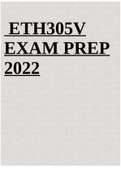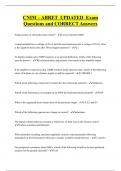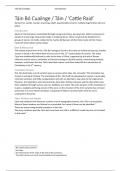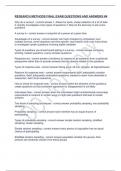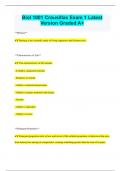Internationaal en Europees recht samenvatting
Internationaal deel:
Bestuderen voor week 1 – De Internationale Arbeidsorganisatie (ILO)
1. Rules of the Game: An introduction to the standards-related work of the International Labour
Organization, link: https://www.ilo.org/global/standards/information-resources-and-
publications/publications/WCMS_672549/lang--en/index.htm
Hoofdstuk 1: INTERNATIONAL LABOUR STANDARDS: RULES OF THE GAME FOR A GLOBAL
ECONOMY
Goal ILO is achieving decent work, daarvoor is nodig:
- An international legal framework for fair and stable globalization
- A level playing field for all (race to the bottom voorkomen)
Organen
- International Labour Conference (ILC) 1x per year (June, Geneva)
- Governing Body 3x per year (March, June, October), Geneva
- Decisions taken at GB and ILC
Kenmerkend is tripartite systeem bestaande uit overheden, werkgeversorganisaties en
werknemersorganisaties.
What are international labour standards
International labour standards are legal instruments drawn up by the ILO’s constituents
(governments, employers and workers) setting out basic principles and rights at work. They are
either:
- Conventions: legally binding international treaties that can be ratified. Convention lays down
the basic principles to be implemented by ratifying countries
- Recommendations: non-binding guidelines. supplements the Convention by providing more
detailed guidance on how it could be applied. Recommendations can also be autonomous, i.e
not linked to a Convention
Once a standard is adopted, member States are required, under article 19(6) of the ILO Constitution,
to submit it to their competent authority (normally Parliament) within a period of twelve months for
consideration. In the case of Conventions, this means consideration for ratification. Once it has
ratified a Convention or Protocol, a country is subject to the ILO regular supervisory system, which is
responsible for ensuring that the instrument is applied. For more on the ILO supervisory system
Fundamental Conventions
The ILO Governing Body has identified eight “fundamental” Conventions, covering subjects that are
considered to be fundamental principles and rights at work:
- No. 87: Freedom of Association and Protection of the Right to Organise (1948)
- No. 98: Right to Organise and Collective Bargaining (1949)
- No. 29 Forced Labour (1930)
- No. 105 Forced Labour (1957)
- No. 138 Child Labour (1973)
- No. 182 Worst Forms of Child Labour (1999)
1
, - No. 100 Equal Pay (1958) • No. 111 Discrimination (1958)
Governance (priority) conventions
The ILO Governing Body has also designated another four Conventions as governance (or priority)
instruments, thereby encouraging member States to ratify them because of their importance for the
functioning of the international labour standards system:
- the Labour Inspection Convention, 1947 (No. 81) (and its Protocol of 1995)
- the Labour Inspection (Agriculture) Convention, 1969 (No. 129)
- the Tripartite Consultation (International Labour Standards) Convention, 1976 (No. 144)
- the Employment Policy Convention, 1964 (No. 122)
How are international labour standards created
Who adopts international labour standards?
The International Labour Conference brings together delegations from all ILO member States. Each
delegation comprises:
- 2 Government delegates
- 1 Employer delegate
- 1 Worker delegate
- Government, Employer and Worker delegates each have on vote in plenary
2
, The role of employers and workers organizations
Representative employers’ and workers’ organizations play an essential role in the international
labour standards system, not only as users of the system, but also as constituents of the
Organization. They participate in choosing subjects for new ILO standards and in drafting the texts,
and their votes determine whether or not the International Labour Conference adopts a newly
drafted standard. If a Convention is adopted, employers and workers can encourage a government to
ratify it. If the Convention is ratified, governments are required to report periodically to the ILO on
how they are applying it in law and practice (the same applies to Protocols). Government reports
must also be submitted to the most representative employers’ and workers’ organizations, which
may comment on their content.
- Employers’ and workers’ organizations can also supply information on the application of
Conventions directly to the ILO under article 23(2) of the ILO Constitution.
- They can initiate representations under article 24 of the ILO Constitution. As constituents of
the Organization
- they also participate in the tripartite committees set up to examine representations.
Moreover, an Employer or Worker delegate to the International Labour Conference can also
file a complaint under article 26 of the Constitution.
Hoofdstuk 2: SUBJECTS COVERED BY INTERNATIONAL LABOUR STANDARDS
Hoofdstuk 3: APPLYING AND PROMOTING INTERNATIONAL LABOUR STANDARDS
Regular supervisory system (art. 22 ILO Constitution: ratified conventions & procedural
requirements)
Once a country has ratified an ILO Convention, it is required to report regularly on the measures it
has taken for its implementation. Every three years, governments have to provide reports detailing
the steps they have taken in law and practice to apply any of the eight fundamental and four
governance Conventions that they have ratified. For all other Conventions, reports have to be
provided every six years, except for Conventions that have been “shelved” (which are no longer
supervised on a regular basis). Reports on the application of Conventions may be requested at
shorter
Committee of Experts on the Application of Conventions and Recommendations
When examining the application of international labour standards, the Committee of Experts makes
two kinds of comments to governments:
- Observations: Observations contain comments on fundamental questions raised by the
application of a particular Convention in a State. These observations are published in the
annual report of the Committee of Experts.
- Direct requests: Direct requests relate to more technical questions or requests for further
information. They are not published in the report, but are communicated directly to the
governments concerned.
3
Internationaal deel:
Bestuderen voor week 1 – De Internationale Arbeidsorganisatie (ILO)
1. Rules of the Game: An introduction to the standards-related work of the International Labour
Organization, link: https://www.ilo.org/global/standards/information-resources-and-
publications/publications/WCMS_672549/lang--en/index.htm
Hoofdstuk 1: INTERNATIONAL LABOUR STANDARDS: RULES OF THE GAME FOR A GLOBAL
ECONOMY
Goal ILO is achieving decent work, daarvoor is nodig:
- An international legal framework for fair and stable globalization
- A level playing field for all (race to the bottom voorkomen)
Organen
- International Labour Conference (ILC) 1x per year (June, Geneva)
- Governing Body 3x per year (March, June, October), Geneva
- Decisions taken at GB and ILC
Kenmerkend is tripartite systeem bestaande uit overheden, werkgeversorganisaties en
werknemersorganisaties.
What are international labour standards
International labour standards are legal instruments drawn up by the ILO’s constituents
(governments, employers and workers) setting out basic principles and rights at work. They are
either:
- Conventions: legally binding international treaties that can be ratified. Convention lays down
the basic principles to be implemented by ratifying countries
- Recommendations: non-binding guidelines. supplements the Convention by providing more
detailed guidance on how it could be applied. Recommendations can also be autonomous, i.e
not linked to a Convention
Once a standard is adopted, member States are required, under article 19(6) of the ILO Constitution,
to submit it to their competent authority (normally Parliament) within a period of twelve months for
consideration. In the case of Conventions, this means consideration for ratification. Once it has
ratified a Convention or Protocol, a country is subject to the ILO regular supervisory system, which is
responsible for ensuring that the instrument is applied. For more on the ILO supervisory system
Fundamental Conventions
The ILO Governing Body has identified eight “fundamental” Conventions, covering subjects that are
considered to be fundamental principles and rights at work:
- No. 87: Freedom of Association and Protection of the Right to Organise (1948)
- No. 98: Right to Organise and Collective Bargaining (1949)
- No. 29 Forced Labour (1930)
- No. 105 Forced Labour (1957)
- No. 138 Child Labour (1973)
- No. 182 Worst Forms of Child Labour (1999)
1
, - No. 100 Equal Pay (1958) • No. 111 Discrimination (1958)
Governance (priority) conventions
The ILO Governing Body has also designated another four Conventions as governance (or priority)
instruments, thereby encouraging member States to ratify them because of their importance for the
functioning of the international labour standards system:
- the Labour Inspection Convention, 1947 (No. 81) (and its Protocol of 1995)
- the Labour Inspection (Agriculture) Convention, 1969 (No. 129)
- the Tripartite Consultation (International Labour Standards) Convention, 1976 (No. 144)
- the Employment Policy Convention, 1964 (No. 122)
How are international labour standards created
Who adopts international labour standards?
The International Labour Conference brings together delegations from all ILO member States. Each
delegation comprises:
- 2 Government delegates
- 1 Employer delegate
- 1 Worker delegate
- Government, Employer and Worker delegates each have on vote in plenary
2
, The role of employers and workers organizations
Representative employers’ and workers’ organizations play an essential role in the international
labour standards system, not only as users of the system, but also as constituents of the
Organization. They participate in choosing subjects for new ILO standards and in drafting the texts,
and their votes determine whether or not the International Labour Conference adopts a newly
drafted standard. If a Convention is adopted, employers and workers can encourage a government to
ratify it. If the Convention is ratified, governments are required to report periodically to the ILO on
how they are applying it in law and practice (the same applies to Protocols). Government reports
must also be submitted to the most representative employers’ and workers’ organizations, which
may comment on their content.
- Employers’ and workers’ organizations can also supply information on the application of
Conventions directly to the ILO under article 23(2) of the ILO Constitution.
- They can initiate representations under article 24 of the ILO Constitution. As constituents of
the Organization
- they also participate in the tripartite committees set up to examine representations.
Moreover, an Employer or Worker delegate to the International Labour Conference can also
file a complaint under article 26 of the Constitution.
Hoofdstuk 2: SUBJECTS COVERED BY INTERNATIONAL LABOUR STANDARDS
Hoofdstuk 3: APPLYING AND PROMOTING INTERNATIONAL LABOUR STANDARDS
Regular supervisory system (art. 22 ILO Constitution: ratified conventions & procedural
requirements)
Once a country has ratified an ILO Convention, it is required to report regularly on the measures it
has taken for its implementation. Every three years, governments have to provide reports detailing
the steps they have taken in law and practice to apply any of the eight fundamental and four
governance Conventions that they have ratified. For all other Conventions, reports have to be
provided every six years, except for Conventions that have been “shelved” (which are no longer
supervised on a regular basis). Reports on the application of Conventions may be requested at
shorter
Committee of Experts on the Application of Conventions and Recommendations
When examining the application of international labour standards, the Committee of Experts makes
two kinds of comments to governments:
- Observations: Observations contain comments on fundamental questions raised by the
application of a particular Convention in a State. These observations are published in the
annual report of the Committee of Experts.
- Direct requests: Direct requests relate to more technical questions or requests for further
information. They are not published in the report, but are communicated directly to the
governments concerned.
3


